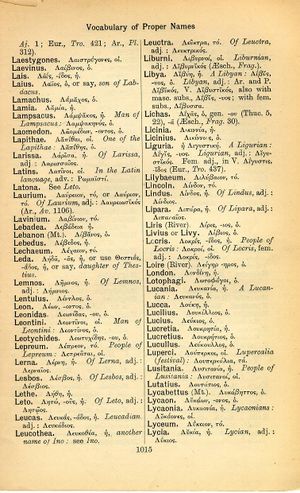Lerna: Difference between revisions
τίς γὰρ ἁδονᾶς ἄτερ θνατῶν βίος ποθεινὸς ἢ ποία τυραννίς; τᾶς ἄτερ οὐδὲ θεῶν ζηλωτὸς αἰών → What human life is desirable without pleasure, or what lordly power? Without it not even the life of the gods is enviable.
(Gf-D_5) |
(3_8) |
||
| Line 10: | Line 10: | ||
{{Gaffiot | {{Gaffiot | ||
|gf=<b>Lerna</b>,¹³ æ, f., [poet.] Cic. Tusc. 2, 22 ; Virg. En. 6, 287 ; <b>Lernē</b>, ēs, f., *Prop. 2, 26, 48 ; [[Mela]] 2, 51, Lerne [marais de l’Argolide où Hercule tua l’Hydre] || <b>-næus</b>, a, um, de Lerne : Lucr. 5, 26 ; Virg. En. 8, 300 ; Prop. 2, 19, 9 || argien, grec : Stat. Th. 4, 638 ; 5, 499.||<b>-næus</b>, a, um, de Lerne : Lucr. 5, 26 ; Virg. En. 8, 300 ; Prop. 2, 19, 9||argien, grec : Stat. Th. 4, 638 ; 5, 499. | |gf=<b>Lerna</b>,¹³ æ, f., [poet.] Cic. Tusc. 2, 22 ; Virg. En. 6, 287 ; <b>Lernē</b>, ēs, f., *Prop. 2, 26, 48 ; [[Mela]] 2, 51, Lerne [marais de l’Argolide où Hercule tua l’Hydre] || <b>-næus</b>, a, um, de Lerne : Lucr. 5, 26 ; Virg. En. 8, 300 ; Prop. 2, 19, 9 || argien, grec : Stat. Th. 4, 638 ; 5, 499.||<b>-næus</b>, a, um, de Lerne : Lucr. 5, 26 ; Virg. En. 8, 300 ; Prop. 2, 19, 9||argien, grec : Stat. Th. 4, 638 ; 5, 499. | ||
}} | |||
{{Georges | |||
|georg=Lerna, ae, f. u. Lernē, ēs, f. ([[Λέρνη]]), [[ein]] [[See]], [[sowie]] [[ein]] ihn durchfließender [[Fluß]] u. eine in der [[Nähe]] liegende [[Stadt]] [[bei]] [[Argos]] im Peloponnes, wo Herkules die vielköpfige lernäische [[Schlange]] u. den ungeheuren [[Krebs]], der der [[Schlange]] zu [[Hilfe]] kam, tötete, Verg. Aen. 12, 518. [[Mela]] 2, 3, 9 (2. § 51). Cic. poët. Tusc. 2, 22; vgl. Hyg. fab. 30: [[belua]] Lernae, die lernäische [[Schlange]], Verg. Aen. 6, 287: griech. Akk. Lernān, Stat. Theb. 11, 434. – Dav. Lernaeus, a, um (Λερναιος), a) lernäisch, [[anguis]], Verg., [[serpens]], Amm., [[hydra]], Prop., [[echidna]], Ov.: [[cancer]], Colum. – b) poet. = argivisch, griechisch, Stat. | |||
}} | }} | ||
Revision as of 09:27, 15 August 2017
English > Greek (Woodhouse)
Λέρνη, ἡ.
Of Lerna, adj.: Λερναῖος.
Latin > English (Lewis & Short)
Lerna: ae, and Lernē, ēs, f., = Λέρνη,
I a forest and marsh near Argos, through which flowed a stream of the same name; the abode of the Lernæan Hydra, which Hercules slew with the help of Iolāus, and then drained the marsh: belua Lernae, Verg. A. 6, 287: anguifera, Stat. S. 2, 181: fecunda veneno, id. Theb. 9, 340: haec dextra Lernam Placavit, Cic. poët. Tusc. 2, 9, 22: et Lerne pulsa tridente palus, Prop. 2, 26, 48 (3, 22, 20), where Müll. Lernae: Lerne, also a town situated there, acc. to Mel. 2, 3, 9.—Hence,
II Lernaeus, a, um, adj., Lernæan: pestis, Lucr. 5, 26: anguis, Verg. A. 8, 300: hydra, Prop. 2, 19, 9: mixtus Lernaei labe veneni, Ov. M. 9, 130: sagittae, with which Hercules killed the Hydra, Luc. 6, 392: cancer, killed by Hercules at the same time with the Hydra, Col. poët. 10, 313. —
B Poet., transf., Argive, Grecian: Lernaei reges, Stat. Th. 5, 499: alumni, id. ib. 4, 638: coloni, id. ib. 3, 461.
Latin > French (Gaffiot 2016)
Lerna,¹³ æ, f., [poet.] Cic. Tusc. 2, 22 ; Virg. En. 6, 287 ; Lernē, ēs, f., *Prop. 2, 26, 48 ; Mela 2, 51, Lerne [marais de l’Argolide où Hercule tua l’Hydre] || -næus, a, um, de Lerne : Lucr. 5, 26 ; Virg. En. 8, 300 ; Prop. 2, 19, 9 || argien, grec : Stat. Th. 4, 638 ; 5, 499.
Latin > German (Georges)
Lerna, ae, f. u. Lernē, ēs, f. (Λέρνη), ein See, sowie ein ihn durchfließender Fluß u. eine in der Nähe liegende Stadt bei Argos im Peloponnes, wo Herkules die vielköpfige lernäische Schlange u. den ungeheuren Krebs, der der Schlange zu Hilfe kam, tötete, Verg. Aen. 12, 518. Mela 2, 3, 9 (2. § 51). Cic. poët. Tusc. 2, 22; vgl. Hyg. fab. 30: belua Lernae, die lernäische Schlange, Verg. Aen. 6, 287: griech. Akk. Lernān, Stat. Theb. 11, 434. – Dav. Lernaeus, a, um (Λερναιος), a) lernäisch, anguis, Verg., serpens, Amm., hydra, Prop., echidna, Ov.: cancer, Colum. – b) poet. = argivisch, griechisch, Stat.

